The theme of our 2024 CEO Survey is centred around business reinvention and the need for this to be a constant focus for CEOs. In an environment of the rapidly increasing influence of Generative AI, a shortage of appropriate skills in the workforce, and macroeconomic volatility; having an agility to ‘pivot’ and change is essential for a long-term, sustainable business. Download the report to read more.
Download PDF
audio new image
CEO survey 2024 video
“As we begin 2024 New Zealand businesses are finding themselves in a unique, but in many ways familiar, environment. They still face a magnitude of challenges and must respond to a number of immediate and pressing issues now, while also reinventing their business models to be fit for the future.
Conflicts around the world remain a threat to our trade and supply chains, including in the Ukraine and Middle East. Our country’s infrastructure deficit continues to impact productivity gains. Rising political and societal expectations, the need to take action on climate change, along with the ongoing influence of disruptive technologies, specifically AI, present both new challenges and opportunities. Long-term considerations are catalysing change much faster than before and are becoming ever more urgent.
At the same time businesses are experiencing a number of shorter term challenges. However, compared to this time last year, these do appear to be less threatening. Inflation is starting to decline and there is every reason to believe that will continue. Likewise, the risk of a deep recession now appears to be less likely and we are seeing a steady labour market. We also have a new Coalition Government who is starting to enact its 100 day plan.
Critical for CEOs is the need to balance these long-term and short-term issues in an integrated way for sustainable success. Consistency in operating across these two time horizons will be crucial for the foreseeable future.
When we completed our survey in November last year we found 23% of local business leaders believe their companies will not be economically viable in the next decade, significantly lower than the Asia Pacific (63%) and global (45%) averages. This raises the question, are CEOs in New Zealand acting fast enough to transform their business models? In short, what we do as leaders in the next two years will significantly influence how our businesses fare in the next ten. Businesses need conviction to make some important decisions - how they adapt now will be a big determinant in long-term success.
"What we do as leaders in the next two years will significantly influence how our businesses fare in the next ten."
Mark Averill |CEOOur survey results also showed New Zealand CEOs are taking steps to drive transformative change, including focusing on investing in essential skills and technologies. But we should remember that simply adapting will not be enough. Continuous reinvention is crucial for long-term business sustainability.
Top of mind for most CEOs is understanding the impact and opportunity that Generative AI (GenAI) will have for their businesses and employees. CEOs see its potential to significantly improve productivity and value creation, help their people develop new skills, and free them up from routine tasks. However, implementing GenAI will take time and require a strong foundation in governance and cyber security. We need to integrate new technologies into our operations carefully and with well thought out plans that work for our businesses.
Reflecting on our survey results and also the recent conversations I’ve had with business leaders over these past few weeks, there is a feeling of realistic optimism around business growth. Whilst CEOs continue to navigate a number of headwinds, there are still plenty of reasons to feel positive about what the next year will bring. That said, it will be important to keep a watchful eye on what happens around the world - 2024 will see much change geopolitically which, as we all know, will have a broader global economic impact from which New Zealand is not immune.
As I prepare to retire and step down as CEO of PwC New Zealand on 31 March 2024, I’m mindful this is the last time I’ll be sharing our survey findings with you. So to finish, I thought I’d answer the question I’ve been asked a lot lately, which is what have I observed most in my time leading PwC New Zealand?
Most notable is the number of CEOs who have expanded their view of transformation. Back in the pre-COVID era, many leaders were focused specifically on technology implementation. Today, more CEOs are prioritising full business transformation with broader consideration for things like nimble workforces and climate change. Over these past seven and a half years, I’ve also observed rising stakeholder expectations and the need for businesses to play an even bigger role in solving some of society’s most important issues. This in my mind is absolutely fundamental to our country’s prosperity. Lastly, with the exponential pace of change, gone are the days of only long-term planning. Businesses need to quickly assess - and reassess - in order to adapt to the environment around them.
There’s no doubt that during my tenure we’ve seen immense change and disruption. It’s been an incredible ride and an absolute privilege to see businesses survive and thrive through this unique time in history.
Finally, I would like to express my gratitude to the more than 100 CEOs who participated in this year’s survey and to those who have consistently shared their views with us over my time as PwC New Zealand’s CEO. I hope you find the report thought-provoking and a useful guide on your path to reinvention.”
Mark Averill, CEO
Only have a few minutes?
A more confident economic outlook
This year’s survey results reveal local CEOs have a more positive outlook for global and local economic growth in 2024.
We found that 48% of local business leaders in New Zealand are optimistic about global economic growth prospects over the next 12 months, up from 13% last year and higher than the global average of 38% this year. This optimism is also reflected in their outlook for New Zealand’s economic growth, with 52% believing it will get better or stay the same, compared to 23% last year.
When it comes to areas of concern, macroeconomic volatility is still seen as a major threat, with all New Zealand CEOs surveyed acknowledging their business is exposed in some way. Inflation is also putting pressure on business decisions, although fewer CEOs (21%) believe they will be highly exposed to inflationary pressures in the next year, compared to 38% last year. This may be due to a decrease in interest rates and the expectation that the inflation rate will fall further, leading to improved consumer sentiment and an increase in disposable income.
All New Zealand business leaders surveyed anticipate being exposed to geopolitical conflict in the coming year. However, despite escalating tensions in the Middle East and ongoing conflicts in the regions, the proportion of CEOs who believe their business will be affected at a moderate, high, or extreme level has decreased from 51% last year to 31% this year. In the Asia Pacific region, 51% of CEOs share the same concerns, while globally 53% of CEOs express a similar level of apprehension.
The survey reveals that 36% of local CEOs are extremely confident in their own organisation’s potential for revenue growth in the next 12 months, compared to 39% last year. CEOs are more optimistic about their three-year revenue growth prospects compared to the shorter term with 50% feeling extremely confident. However, the longer term picture is challenging, due to geopolitical volatility and the increasing pace of technology change.
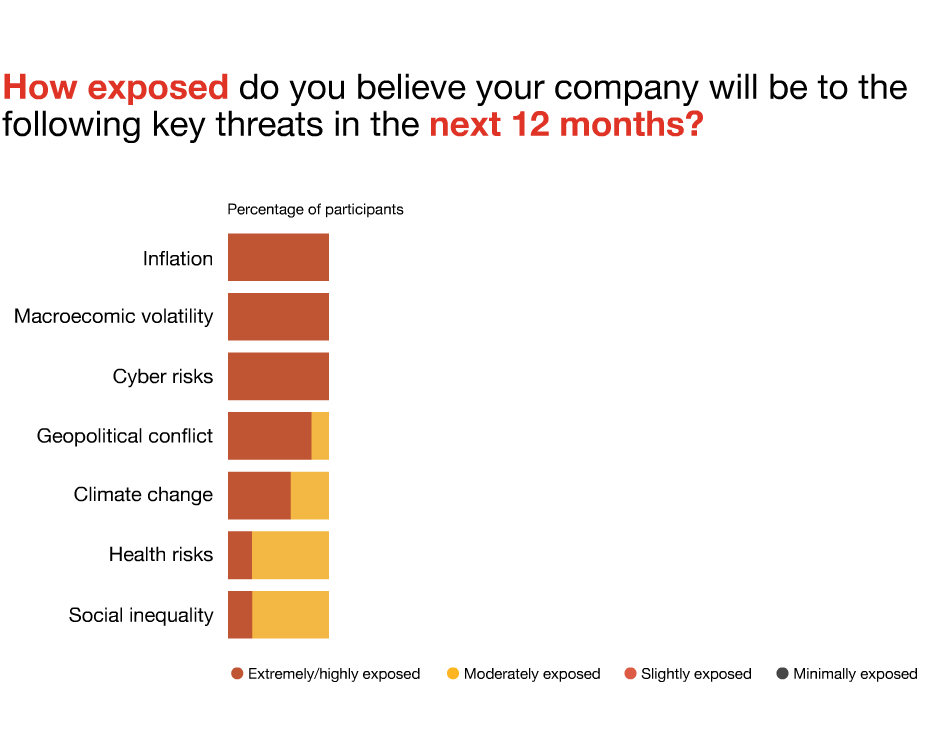
“CEOs can finally feel more confident about making those bold strategic decisions they’ve been hesitant about taking in recent years.”
Alex Wondergem | PartnerShifting to positive sentiment

“There are reasons to believe that the pessimistic period has passed and that we can now be more confident that, with the risks of a recession reduced, things will likely improve again this year.
If the survey was conducted in early 2024 instead of during October and November 2023, I think we would see less negativity among CEOs regarding their company’s potential revenue growth. Around the time of the survey, interest rates were at their peak and the Reserve Bank of New Zealand was predicting further increases. It was a time of heightened uncertainty.
However, since then, we have seen a moderation in interest rate levels, with potential decreases later in the calendar year owing to an anticipation of inflation returning to the target range of 1-3%. These factors, including a new government, have instilled a greater sense of hope and optimism as evidenced in recent business outlook surveys.
There are reasons to believe that with a period of uncertainty passing, we can now be more confident that economic activity will begin to improve this year.”
Alex Wondergem, Partner
The imperative to reinvent
Business reinvention will be key for all New Zealand companies to thrive. The survey results show that most local executives are taking steps to do this, but are they doing enough now to succeed in the long-term?
The research reveals that 23% of business leaders here believe their companies will not be economically viable in the next decade, if they continue on their current path. This is a slight decline compared to 2023 (27%), but significantly lower than the Asia Pacific average (63%) and the global average (45%).
We asked New Zealand CEOs what they have done to drive transformation. Ninety-five per cent have taken steps to change how they create, deliver, and capture value over the past five years. During that time, 70% have implemented at least one action that had a large or very large impact on their company’s business model.
Compared to the past five years, CEOs here expect changes related to technology (54%), evolving customer preferences (48%) and government regulations (37%) to have a more significant impact on how they deliver value in the next three years. The perception of near-term threats like supply chain instability (16%) and climate change (21%) have both decreased as business leaders look ahead to the next three years.
Fifty-eight per cent of local CEOs report the regulatory environment as inhibiting their ability to reinvent their business model to at least a moderate extent. Fifty-seven per cent point to competing operational concerns, and 41% highlight a lack of skills in their company’s workforce as the key issues.
These findings indicate that continuous reinvention is an imperative rather than a choice for long-term business sustainability. The pace of change is increasing, which means effective leadership is crucial to maintain energy, challenge the status quo, and keep things moving forward.

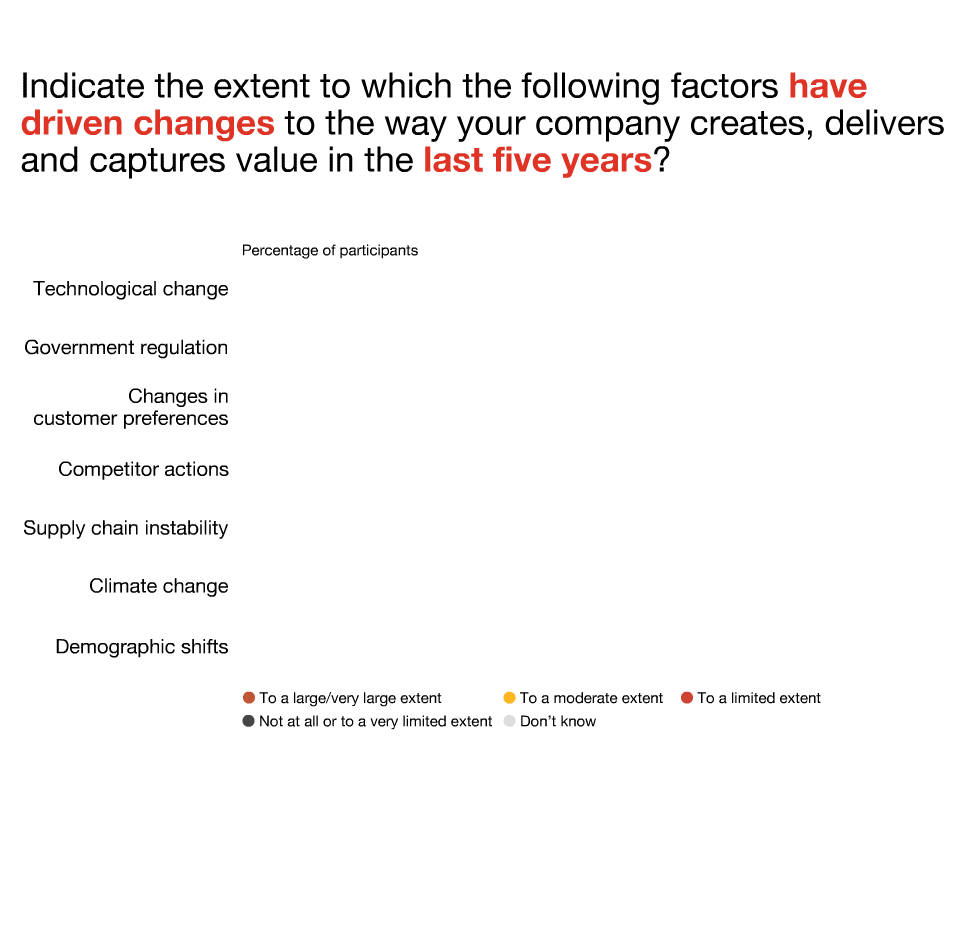
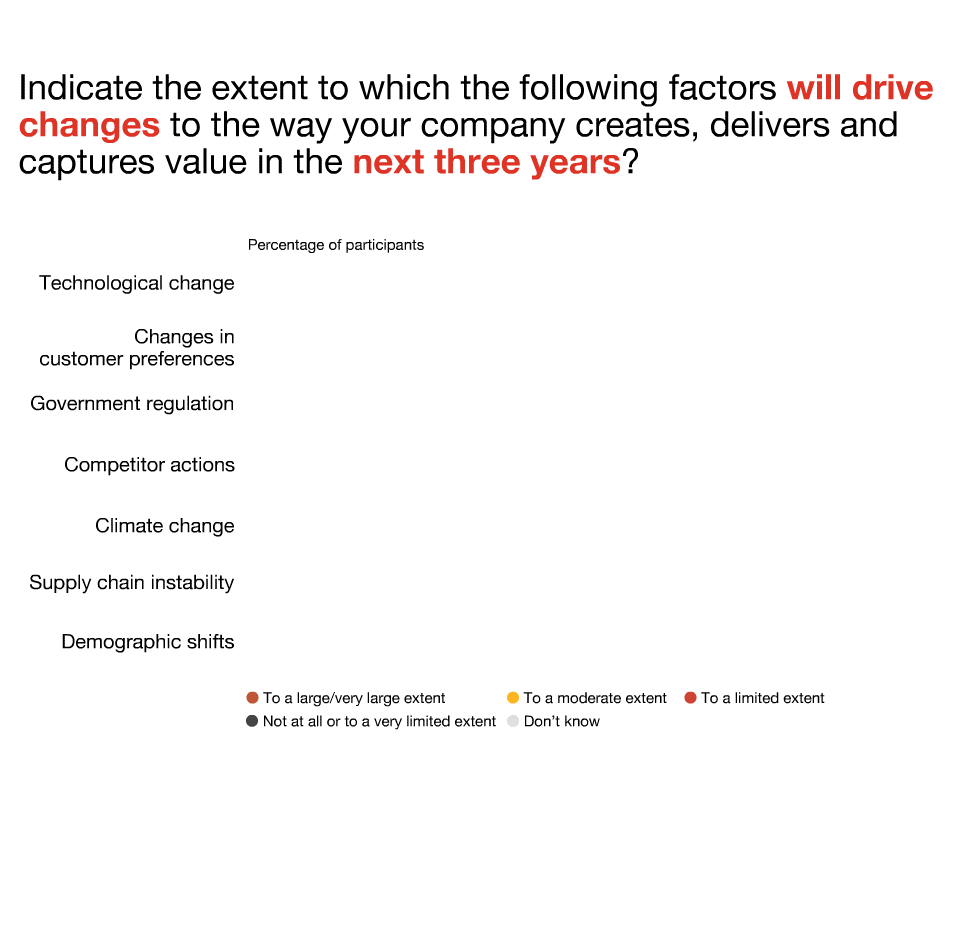
“Continuous reinvention is an imperative rather than a choice for long-term business sustainability.”
Rob Fisher |Technology Consulting Lead PartnerEmbrace continuous reinvention

“Digital transformation is not a fixed destination, but rather a continuous effort to adapt and innovate using technology. Its purpose is to meet the rapidly changing expectations of clients, employees and external business partners.
Disruptive technologies will continue to challenge business models. Board members and senior executives need to understand how capabilities like Generative AI or Augmented Reality can enhance their value proposition to customers and employees.
Although New Zealand businesses are feeling more optimistic about their economic viability, the next decade will be defined by business model reinvention. Those who invest in digital transformation will have the agility and flexibility to meet changing consumer expectations.”
Rob Fisher, Technology Consulting Lead Partner
The Generative AI opportunity and challenge
A year ago, New Zealand CEOs had limited knowledge about Generative AI (GenAI). However, our survey reveals that now, most local business leaders recognise the potential it brings to drive positive changes to their operating models.
We find that 64% of local business leaders believe that GenAI will improve their own efficiency at work and 68% expect it to bring greater efficiency for their employees. Fifty-eight per cent also think that GenAI will enhance the quality of their company's products and services. These findings align with the results of PwC's Global Risk Survey 2023, which showed that 60% of those surveyed globally view GenAI as a business opportunity rather than a risk.
Local CEOs also anticipate significant impacts on their workforce, with 61% predicting that their employees will need to learn new skills due to advancements in GenAI. However, despite this understanding, 61% of CEOs have still to adopt GenAI across their business. Skill gaps, availability of these technologies, concerns around cyber security and the spread of misinformation, are all factors impacting adoption. As with any emerging technology, it will take time for GenAI to gain the necessary trust.
The societal impact of GenAI is still uncertain, but it is clear that the improving capabilities of GenAI models have the potential to greatly reduce the need for people in a range of roles in the future, as well as redefine their purpose and scope. Although we are still in the early stages of this transformation, 28% of New Zealand CEOs already anticipate a decrease in the number of employees in the next 12 months due to GenAI. This is just marginally higher than the global average of 25%.
GenAI may displace some roles but it will also fuel job creation around a range of new areas previously not needed or possible within a business. It will also drive substantial improvements in productivity and efficiency through focusing resources on where they add most value to the business. Sixty-eight per cent of New Zealand CEOs believe GenAI will make their employees more efficient in 2024, in contrast to only 22% of employees surveyed in PwC’s Global Workforce Hopes and Fears Survey 2023 who think that AI will help them increase their productivity and efficiency at work.
These findings highlight the need to upskill employees so they have the necessary tools and capability to be competitive in a rapidly changing AI-enabled world. While it is challenging to predict the future in the medium to long-term, during this initial phase of adoption and transformation, the biggest threat to an organisation is not GenAI itself, but rather a competitor who utilises it more effectively.
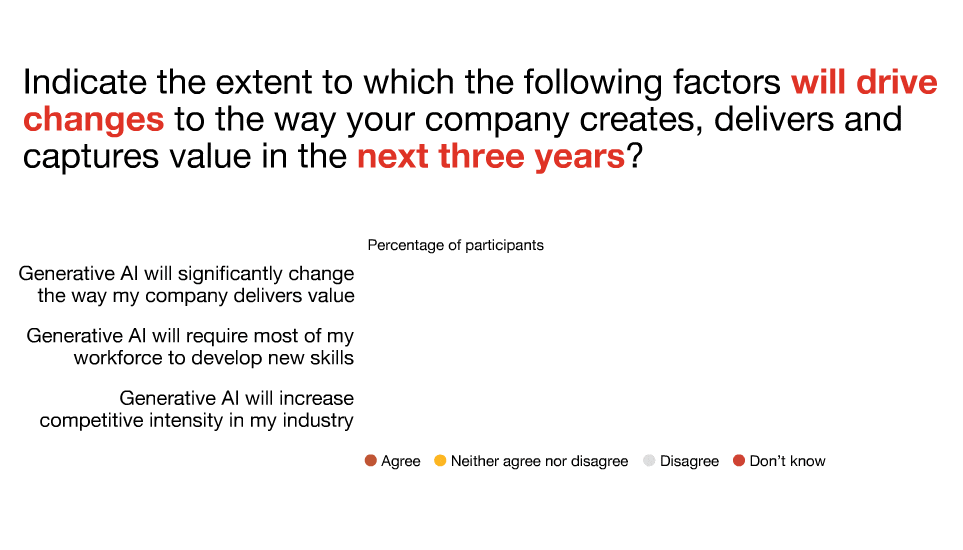
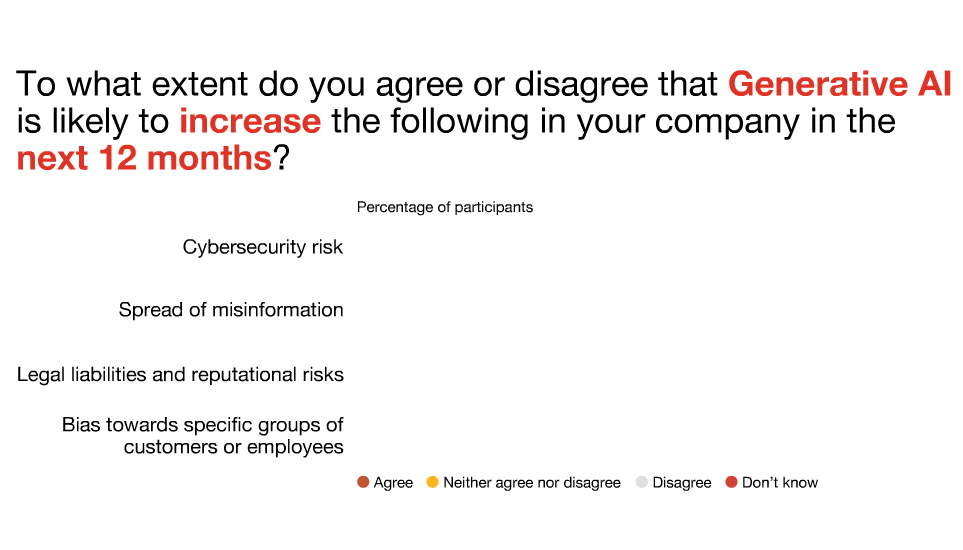
“One of the biggest risks facing organisations is apathy in regards to the impact of GenAI."
Scott McLiver |PartnerMove fast, but responsibly

“The rapid advances in GenAI technology are considered to be one of the most influential developments in human history. Some people believe its impact on society will be as significant as the innovation of electricity.
With a transformative force this large, business leaders must get to grips with what GenAI means for their industry, customers and organisation. This includes establishing rules and guidelines to make sure the use of GenAI is responsible and aligns with their company’s values.
One of the biggest risks facing organisations is apathy in regards to the impact of GenAI.
To responsibly adopt GenAI, CEOs need to create a clear strategy that includes formal processes and internal controls to ensure its ethical use as they explore the benefits of this rapidly growing technology.
According to the survey, 74% of New Zealand CEOs believe that GenAI is likely to increase cyber security risks in the next year. This is an astute assessment because GenAI’s capabilities will certainly be used to make cyber crimes more sophisticated. Cyber security is now more important than ever in a world of advancing GenAI cyber threats.”
For more information about cyber risk management, read PwC’s findings from the 2024 Global Digital Trust Insights and For Gen-AI-enabled threats, fight fire with fire.
Scott McLiver, Asia Pacific Leader in Generative AI and Partner
Investing in a skilled workforce
The research reveals that New Zealand CEOs are concerned about the skills gap across their employees, especially when it comes to technical expertise. The majority of CEOs (83%) report they have a skills shortage within their organisation and 76% specify a lack of technical capabilities as a key barrier to business transformation.
In New Zealand, 14% of CEOs believe that a lack of skills is impeding their business from making significant changes. This percentage is lower than the global average of 20% and the Asia Pacific average of 23%.
We asked business leaders in New Zealand about the actions they are planning to take in the next 12 months to drive increased productivity in their workforce. The top answer, at 72%, was developing leadership and talent. Upskilling and reskilling people came in second at 64%. While this is a focus for CEOs, only 25% of New Zealand employees surveyed in PwC’s Global Workforce Hopes and Fears Survey 2023 believe the skills required for their role will change significantly in the next five years.
“CEOs who are serious about reinvention need to address concerns, encourage curiosity and learning, and empower managers to help their people to adapt.”
Griere Cox |PartnerAddressing the skills gap

“New Zealand CEOs want to focus on improving talent and capabilities within their organisations by investing in upskilling and retaining their current employees. However, many are unsure where to start.
One approach to consider is redesigning career paths based on skills, rather than specific jobs. This gives employees more control and opportunities as jobs evolve or change. Start by identifying the known and less obvious skills of your workforce, beyond what’s listed in their job descriptions. Most organisations never ask about or assess the skills their employees have. They also don’t consider the skills employees have developed over time. Also define the skills your organisation will need in the future. Once you know what skills already exist, and what is needed, you can identify the gaps and take action to fill them.
When hiring new employees, CEOs globally are embracing the concept of ‘skills first’. This approach prioritises a person's skills and competencies, rather than their work experience, or job titles. The idea is to attract, recruit, and develop talent based on their specific skills, rather than relying on traditional criteria. By shifting the focus to skills, regardless of how they were acquired, the ‘skills first’ approach has the potential to open up economic opportunities and create career pathways to quality jobs for a larger number of people compared to traditional methods.”
Griere Cox, Partner
Climate change - work in progress
The latest CEO Survey results reveal that while New Zealand CEOs have made some progress introducing initiatives related to climate change, there is still more work to be done.
Most progress on climate action has been made in decarbonisation. Seventy-four per cent of CEOs are either in the process, or have completed improvements in energy efficiency. Additionally, 68% are working on, or have completed the development of new climate-friendly products, services, or technologies. Local CEOs identified the biggest barriers to decarbonisation as the absence of climate-friendly technologies for their industry and a lack of demand from external stakeholders.
When evaluating investments that are environmentally friendly, 41% of CEOs in New Zealand have accepted lower rates of return in the last 12 months compared to other investments. Seventy-five per cent would be willing to accept a rate of return that is up to 6% lower for climate-friendly investments compared to other investments. This is significant and could promote an increased willingness to explore more climate-driven aspects of business model reinvention, and attract increased levels of investment to do so.
These findings emphasise the need for businesses to consider the risks they face, including the potential cost of falling behind, as we work towards decarbonising the economy. Relying solely on mitigation measures will not adequately prepare them for the future. Instead, business leaders must take advantage of the increasing capital flows towards green and sustainable investment, and the opportunities that are generated through the economy's zero carbon transition.
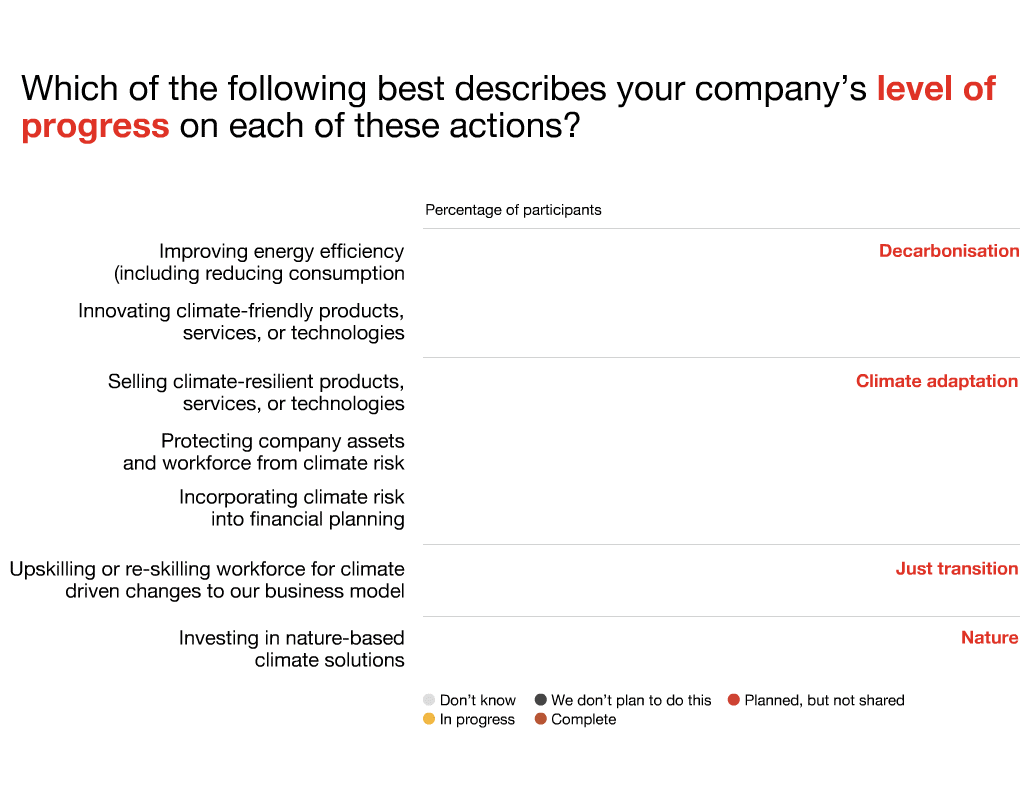
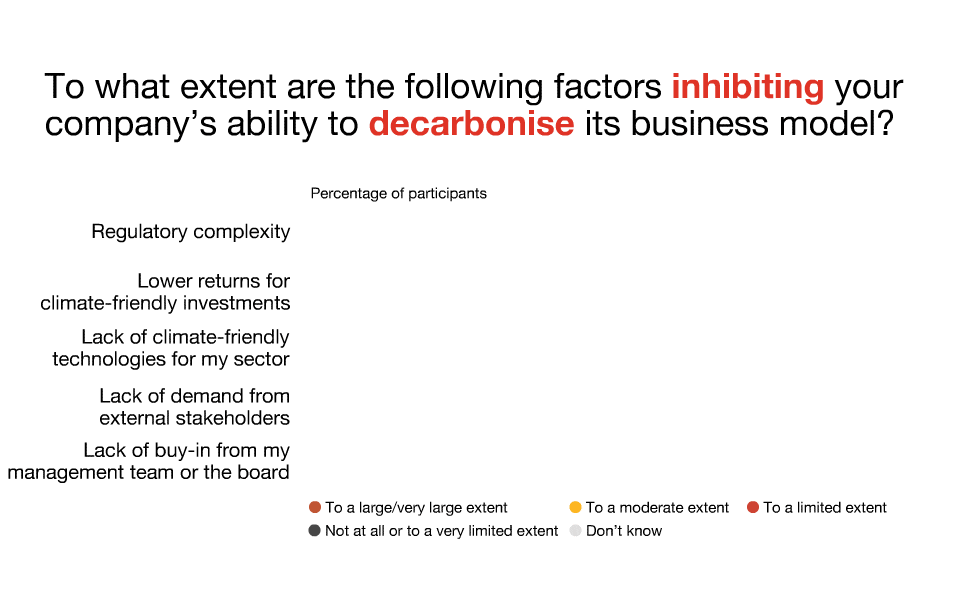
“Leading businesses are seeking opportunities to address climate and nature priorities simultaneously.”
Annabell Chartres |Sustainability, Climate & Nature Leader and PartnerUncertain on climate action

“The survey findings indicate that business leaders in New Zealand are unsure and lack confidence when it comes to adjusting their strategies to prioritise climate action. Those who participated in the survey emphasised the importance of using our country’s natural resources more efficiently and providing better incentives and support for businesses to adopt sustainable practices.
There could be various reasons contributing to this sentiment, such as uncertainty regarding government policies, commitments and actions towards addressing climate change.”
Annabell Chartres, Sustainability, Climate & Nature Leader and Partner
Investing in infrastructure
This year’s results reveal infrastructure challenges are front of mind for New Zealand business leaders. More than half (53%) of the CEOs surveyed believe these challenges are hindering their company’s ability to change how they create, deliver and capture value.
Our country is facing a well-publicised infrastructure deficit. According to Infrastructure New Zealand, this deficit exceeds NZ$200 billion and is projected to widen as the country shifts towards a low carbon economy.
Infrastructure is fundamental to prosperity and wellbeing. It ensures factories have the necessary resources, goods can be transported, houses can be built, clean water is available, and waste is properly managed. It connects people to places and businesses.
What is causing the challenge?
There are several interconnected issues, including financial constraints in financing infrastructure projects, policy and institutional settings, and uncertainty regarding the pipeline of projects. These factors collectively impact the ability to improve efficiency, develop skills, attract investment, innovate and deliver much needed infrastructure.
“There is a huge opportunity to leverage existing technologies and develop new ones to help infrastructure support New Zealand’s long-term economic growth.”
Antonia Robertson |PartnerPartnership - turning barriers into opportunities

“There is an exciting opportunity for collaboration between the public sector, private sector and iwi to innovate and suggest alternative solutions to maintain sustainable, resilient and inclusive infrastructure.
Private and project finance can help kickstart investment, and encourage innovation and efficiency through contractual requirements. However, for these partnerships to succeed, we need the right policies, project certainty and sustainable funding mechanisms in place.
The business opportunity from partnership is broader than simply investment and finance. Collaboration can bring long-term perspectives, innovation (technological and other) and efficiencies that will increase productivity, improve environmental outcomes, and enhance overall wellbeing.”
Antonia Robertson, Partner
Six actions for CEOs to accelerate reinvention

As we enter an age of continuous reinvention, New Zealand CEOs have opportunities to reshape their organisations to thrive on disruption and turn their aspirations into reality.
Having experienced years of ongoing disruptions, New Zealand business leaders have developed a strong resilience that will be crucial as they face significant and comprehensive changes.
To keep progressing, effective leadership and the ability to adapt to new possibilities will be essential. With a better understanding of the challenges of meaningful business transformation, CEOs can begin turning these barriers into opportunities.
"The entire executive team needs to take ownership of the change."
Our PwC Global CEO Survey reveals the importance of business model reinvention for long-term commercial viability and success for every organisation. Simply adapting is not enough. Bold decisions and actions are essential to drive continuous reinvention. As a business leader, you play a pivotal role in steering your organisation along this journey.
Andrew Holmes, Incoming CEO
Contact us
Keren Blakey




















